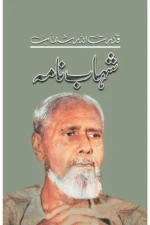Qudrat Ullah Shahab
Qudrat Ullah Shahab (26 February 1917 – 24 July 1986) was a distinguished Pakistani civil servant, diplomat, and Urdu writer, celebrated for his profound contributions to literature and public service. His autobiography, Shahab Nama, remains a seminal work in Urdu literature, offering a unique blend of personal narrative, historical insight, and spiritual reflection.
Early Life and Education
Born in Gilgit, British India (now Pakistan), Shahab hailed from a family with a strong educational background. His father, Abdullah Sahib, was associated with the Muhammadan Anglo-Oriental College under the mentorship of Sir Syed Ahmed Khan. Shahab pursued his education at the Prince of Wales College in Jammu and later at Government College Lahore, where he earned a Master’s degree in English Literature. At the age of 16, he gained international recognition by winning an essay competition organized by Reader’s Digest London.
Civil Service Career
Shahab joined the Indian Civil Service (ICS) in 1941, becoming one of the first Muslims from Jammu and Kashmir to do so. During the Bengal famine of 1943, he served as a magistrate in Nandigram, where he took the bold step of distributing strategic rice reserves to the starving populace, an action that drew criticism from authorities but showcased his humanitarian commitment.
After Pakistan’s independence, Shahab held several key administrative positions:
-
Deputy Secretary in the Ministry of Commerce
-
Chief Secretary of Azad Kashmir
-
Deputy Commissioner of Jhang
-
Director of Industries, Punjab
He notably served as the Principal Secretary to three heads of state: Governor General Ghulam Muhammad, President Iskander Mirza, and President Ayub Khan. In 1962, he was appointed as Pakistan’s Ambassador to the Netherlands and later served as Information Secretary and Education Secretary of Pakistan.
Literary Contributions
Shahab’s literary prowess is most evident in his autobiography, Shahab Nama, published posthumously in 1987. Spanning 1,248 pages, the book offers an intimate portrayal of his life, the socio-political landscape of British India and Pakistan, and his spiritual experiences. It stands as a testament to his narrative skill and deep introspection.
Other notable works include:
-
Ya Khuda – a novel exploring existential themes
-
Maan Ji, Surkh Fita, and Nafsane – collections of short stories
-
Shahab Nagar – a literary miscellany
-
Pathans – an essay on Pashtun culture
Spiritual Inclinations and Legacy
In the concluding chapters of Shahab Nama, Shahab delves into his spiritual journey, introducing readers to a mysterious figure he refers to as “Ninety,” who served as his spiritual guide. This aspect of his life has intrigued readers and added a mystical dimension to his narrative.
Shahab’s influence extended beyond his writings; he was part of a literary trio with contemporaries Mumtaz Mufti and Ashfaq Ahmed, collectively known for enriching Urdu literature with themes of spirituality and humanism.
He passed away on 24 July 1986 in Islamabad and was laid to rest in the H-8 Graveyard. In recognition of his literary contributions, Pakistan Post issued a commemorative postage stamp in his honor in 2013.
Related Topics & Genres
-
Urdu Autobiographical Literature
-
Pakistani Civil Service History
-
Spiritual Narratives in South Asian Literature
-
Post-Colonial Pakistani Literature
Qudrat Ullah Shahab’s life and works continue to inspire readers, offering a rich tapestry of personal experience, historical insight, and spiritual reflection.

